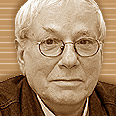
A capital for 2 nations
History teaches us that there is no way for Jerusalem to be solely Jewish
At the end of the day, both the Jews and the Arabs have been fooled for years now. Jerusalem will be neither Arab nor Jewish, but rather, the city of the three major religions. It sits in the narrow margins between a populated country and the desert; between the jackals and Tel Aviv’s skyscrapers. Its light, which comes from the Dead Sea, filled it with glory even before the existence of monotheistic religions in the world. Yet its sanctity has turned it into a punching bag for thousands of years now.
Jerusalem has turned into the root of the Jewish-Arab conflict back when the mufti exploited it and published a photomontage of Herzl on the al-Aqsa Mosque. Ever since then, it has turned into a symbol for a struggle that began with the Balfour Declaration. Zionist and Arab nationalism became the most lethal combination; one that leads to national-religious war.
Yet neither the Jews nor the Arabs really loved Jerusalem. They aspired for it as an eternal city, yet sought to live by the sea. It was safer there, and one can swim somewhere else if needed. Most of the capital’s population is religious; half of it is anti-Zionist and they live there because it’s the holy city and not as part of Israel, which they believe will only be built by the messiah. All the new and giant Jewish neighborhoods where most Jerusalemites live today are in fact political construction that made Jerusalem no longer hard to get.
It appears that Zionism in fact skipped over Zion. It concentrated in the coastal plain, on the shores, in the Jezreel Valley, in the Galilee, and in the Negev. As soldiers, Ben-Gurion ordered us to withdraw from the Old City, even though most Arabs raised white flags. He did not want it as a capital. Members of the rightist Betar movement also spoke highly of Jerusalem, yet its headquarters was always in Tel Aviv.
Jerusalem was empty for 2,000 years; it was home to only a handful of Jews and a handful of Arabs. For a short while it was the capital of the Crusaders, but it stopped playing that role rather quickly. The Arabs never viewed it as a capital, and the Jews preferred to remember it, but only in terms of “next year in Jerusalem.” By the time the next year rolled around they did not come, and if they did come, most of them preferred Tel Aviv, which never attempted to be an eternal city.
One dies in eternity – meanwhile, on the shores and in the valley and in the Galilee a future is being built. In Jerusalem, we create a past.
Pleasant residential town
If Jerusalem so much wishes to be Israel’s capital, and the city’s name is etched on the lips of those who escape it to Tel Aviv every Thursday, then it needs to be both the capital of Palestine and capital of Israel. Not two cities, but rather, one town. A city of two nations and three religions; in fact, a sort of utopia, a word that means “no place” in Greek.
History teaches us that there is no way for Jerusalem to be solely Jewish. This would also not be good for the Jews, because if it is only their capital it will turn into the capital of itself; the Jewish acrimony that grows in the city and its vicinity would not enable it to be the State of Israel’s main city. It’s terribly simple: Either Israel and Palestine – or Jerusalem.
The decision we face is not easy. There is no city that prompted the spilling of more blood than Jerusalem. It’s the longing for everything pertaining to God, yet He apparently did not love it, as He allowed it to be razed so many times. Jerusalem is longing for the past.
Forget about using the city as a symbol. Turn it into a pleasant residential town, free of the nationalism of both sides. We shall live there together. We shall have a state of high-tech and culture in Herzliya, Tel Aviv and Haifa. Whoever wishes to reside in Jerusalem will live there as the citizen of Israel or Palestine and pay municipal taxes to a joint Palestinian-Jewish city hall.
Israel will free up for building a model state, as its founders wanted. Meanwhile, we will always be able to live in Jerusalem as a united city, rather than a city one dreams of on the eve of Passover, mostly from the outside.
People always say “let’s resolve the whole conflict, and only then get to the Jerusalem issue.” Yet we need to start precisely with this wound. Let’s resolve the problem of ownership of a city that cannot be the capital of Israel or Palestine but rather, only the capital of both nations. Should an effective solution be found, we may be able to embark on some kind of hopeful road.










